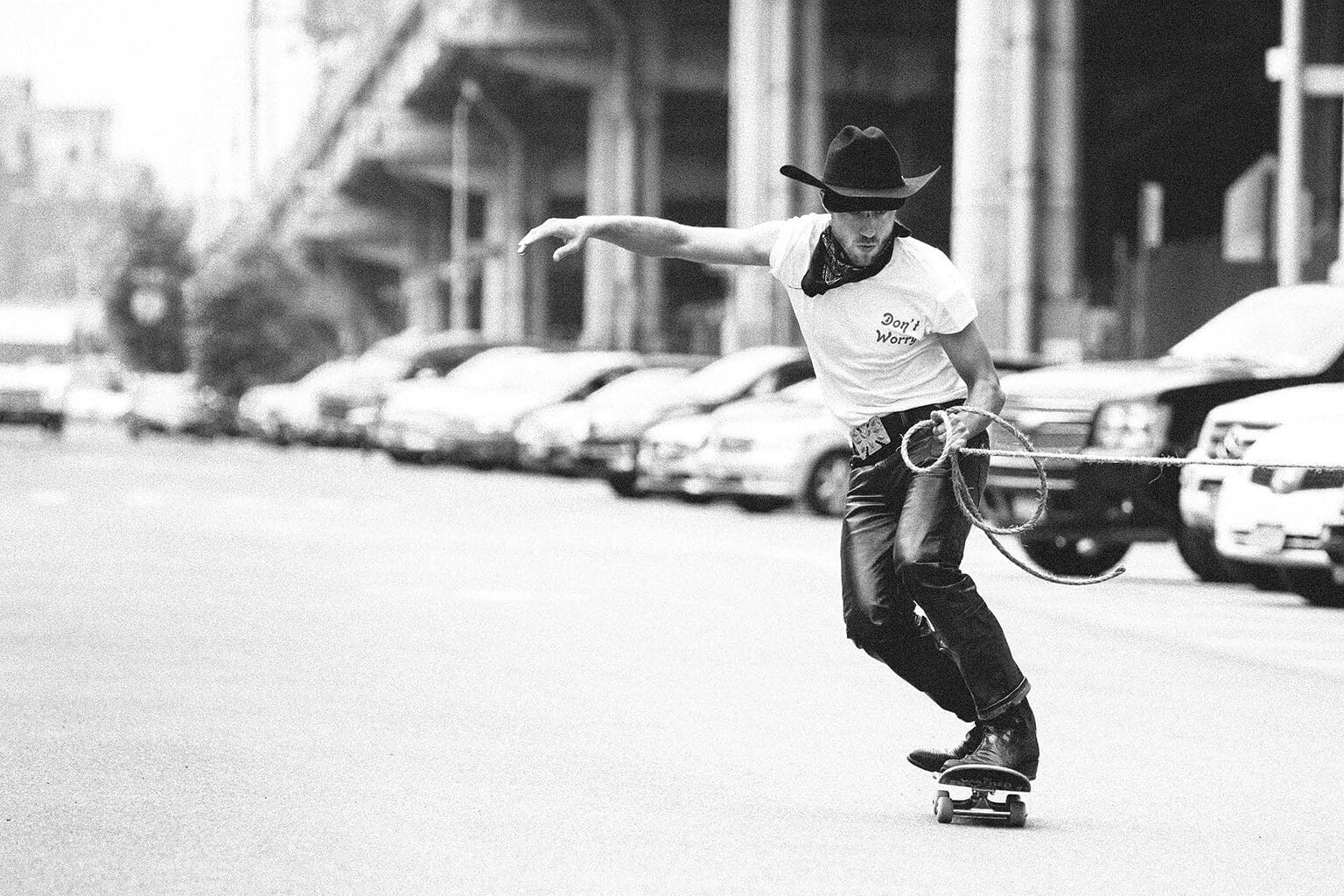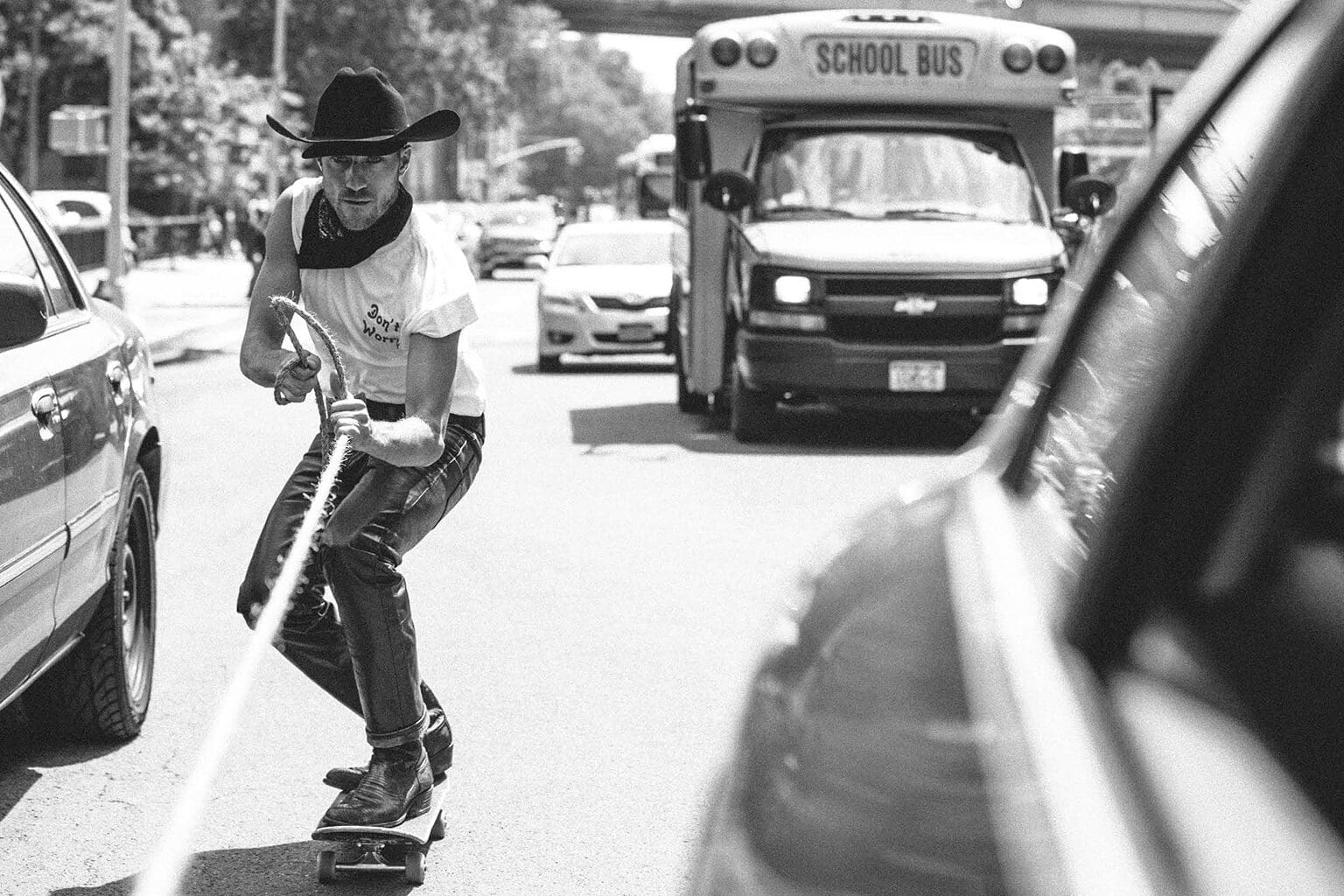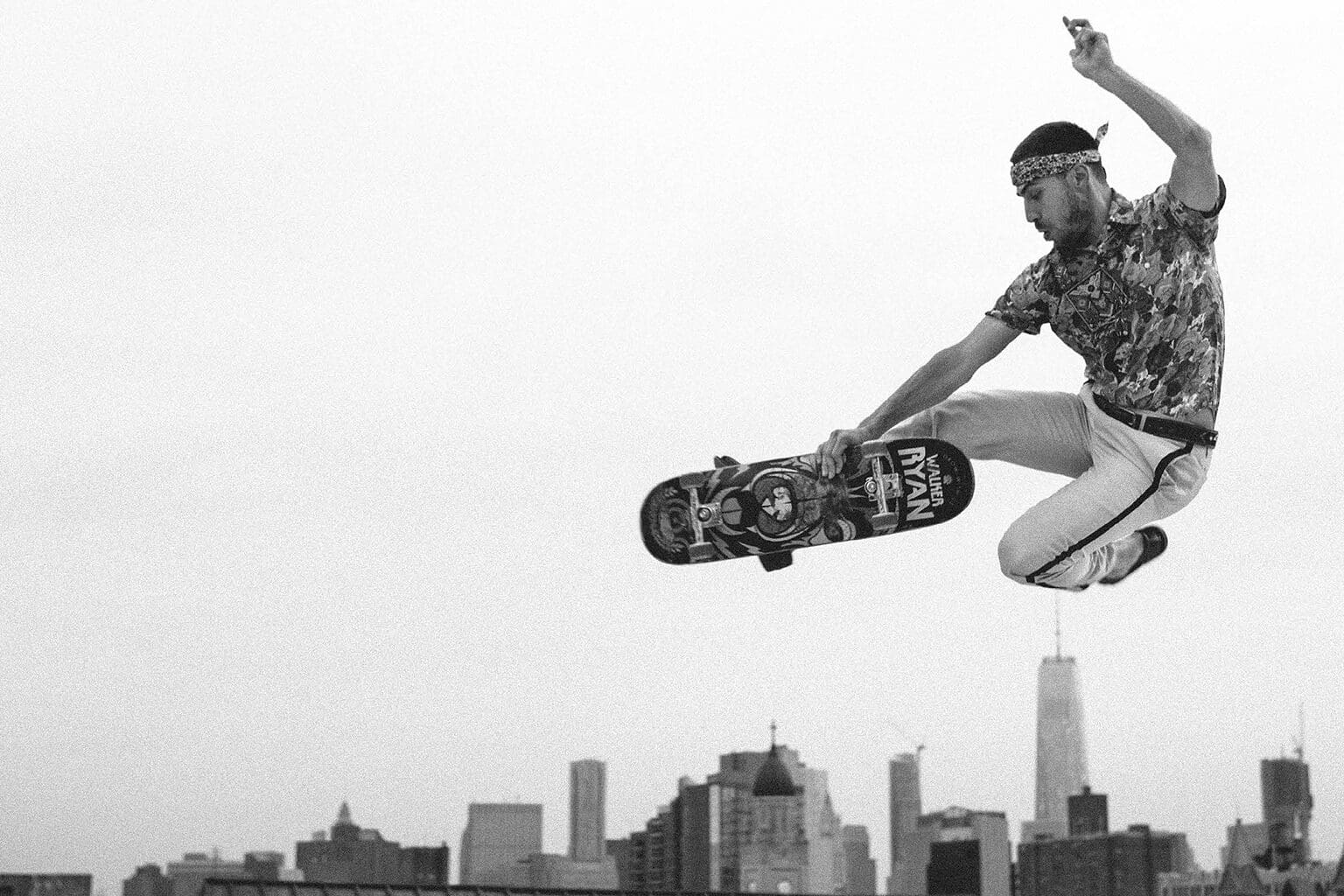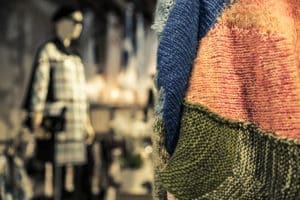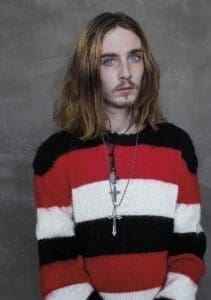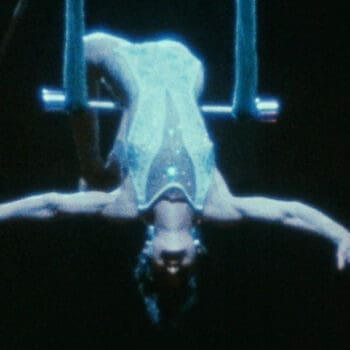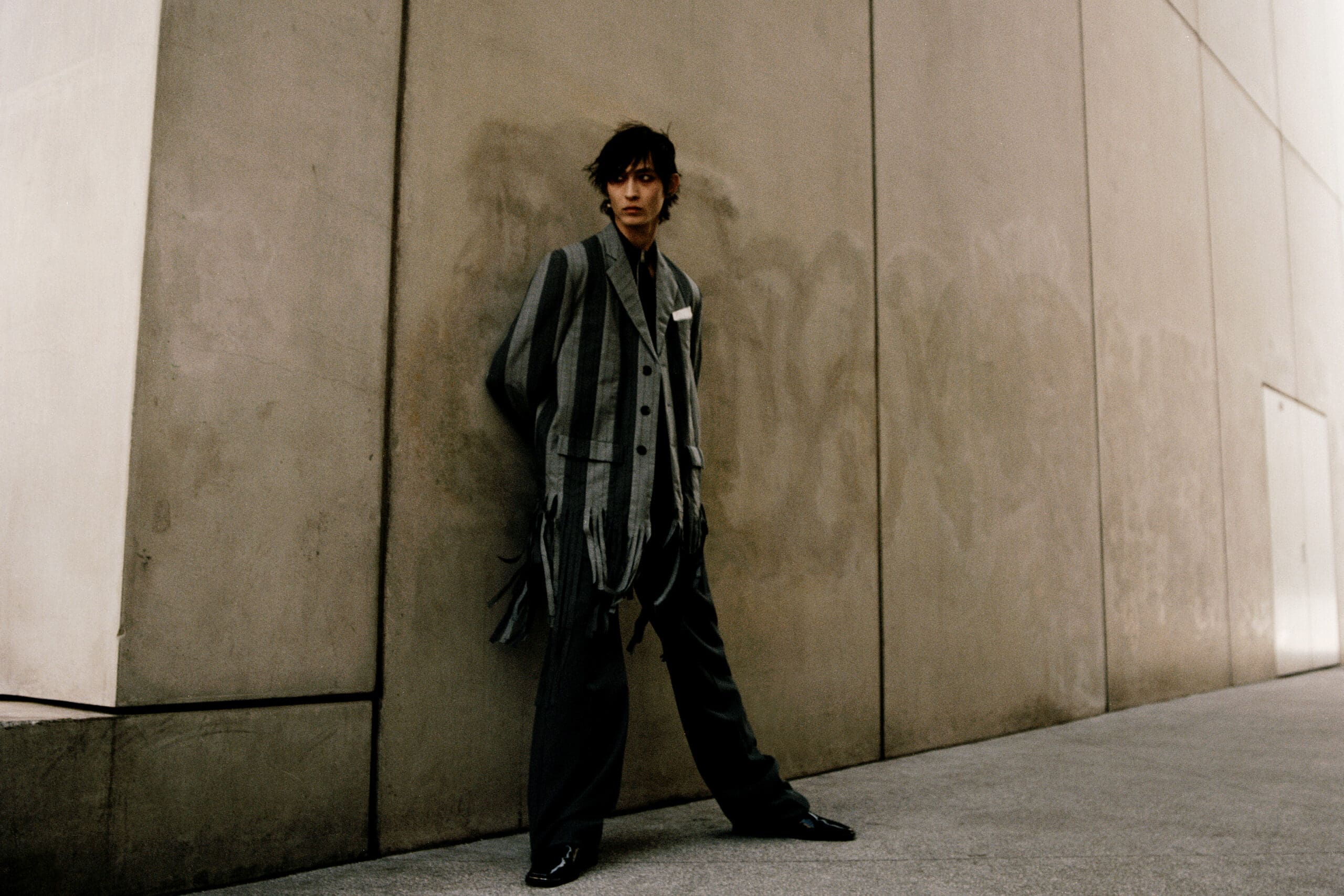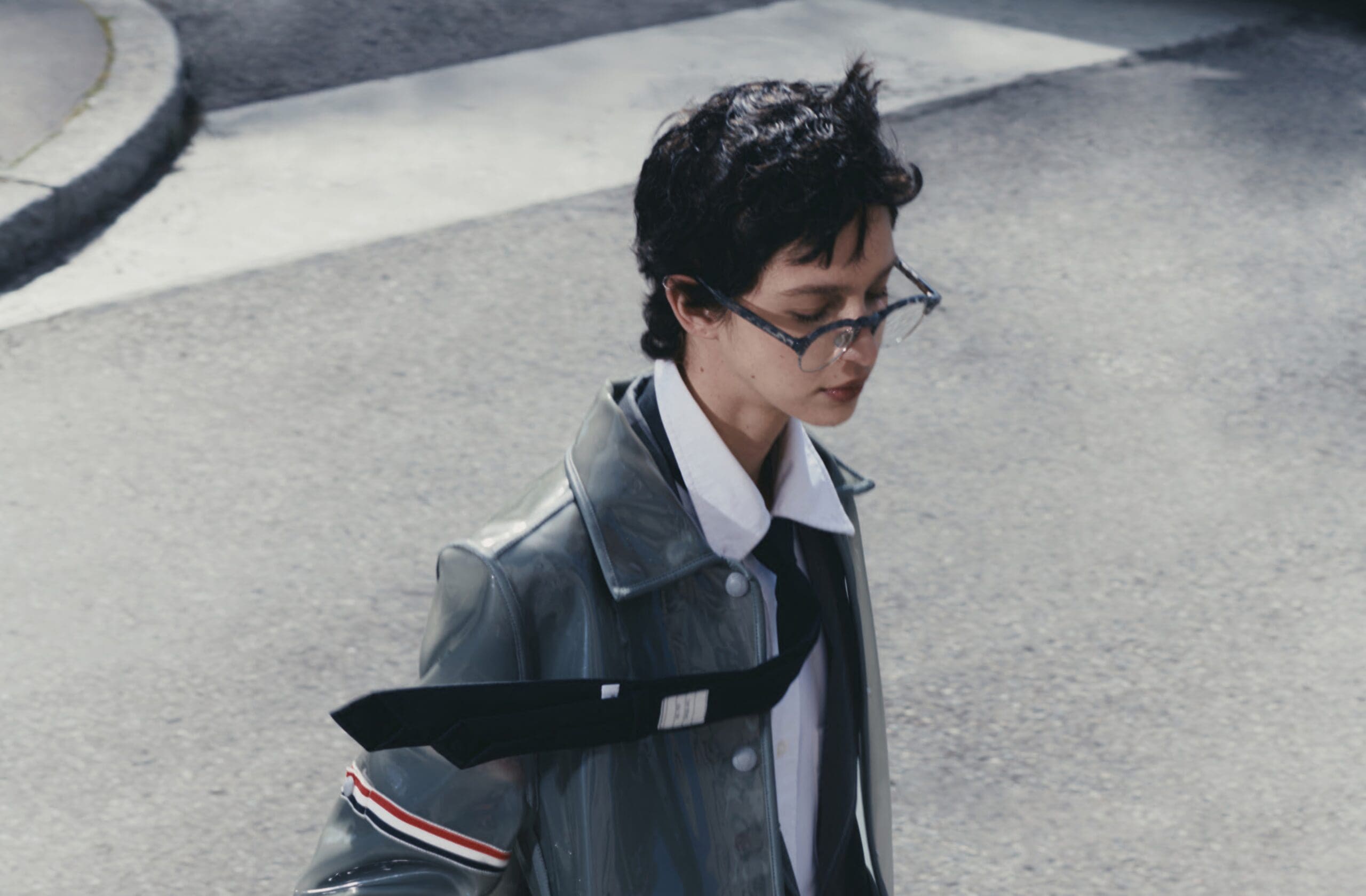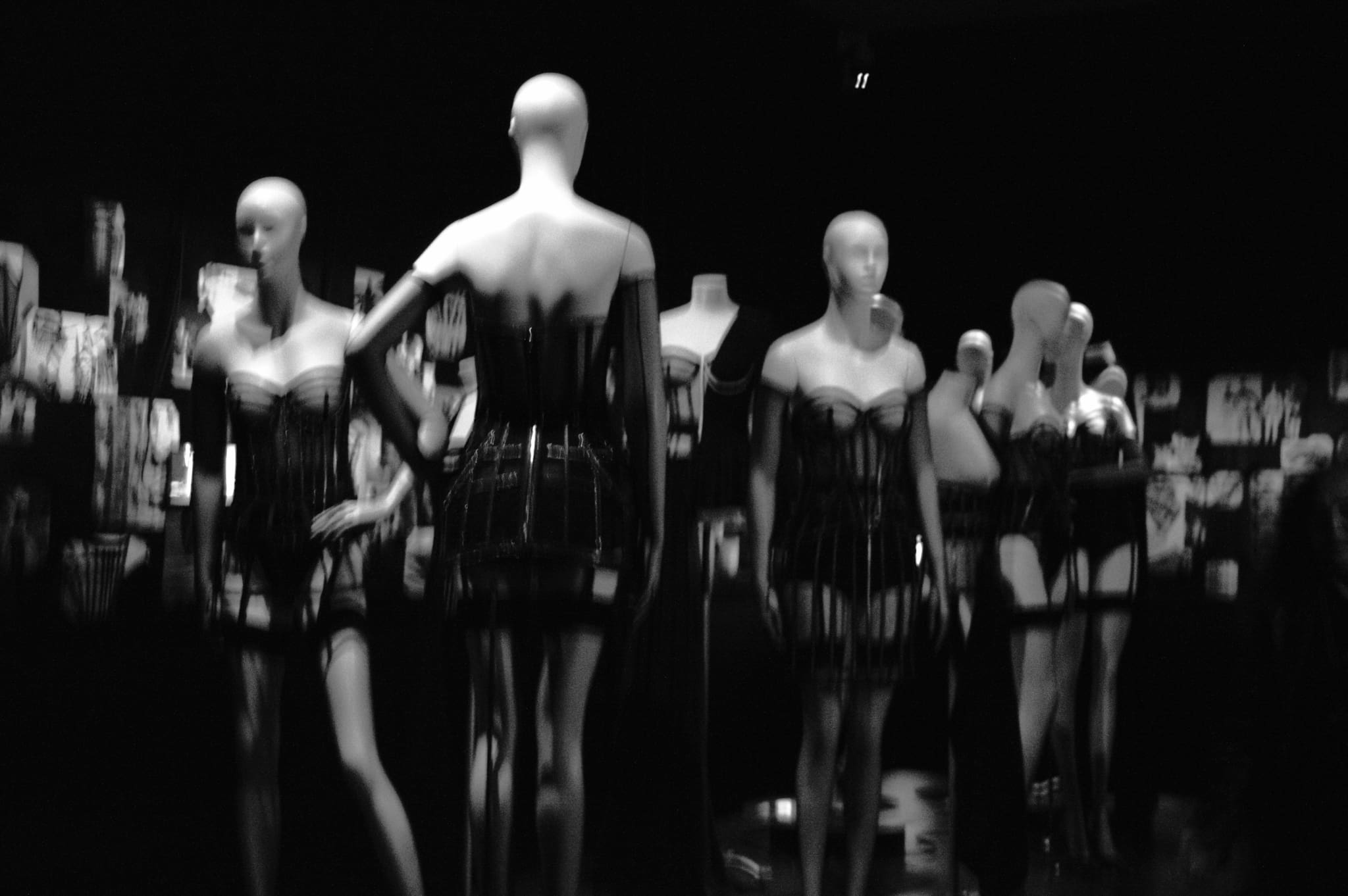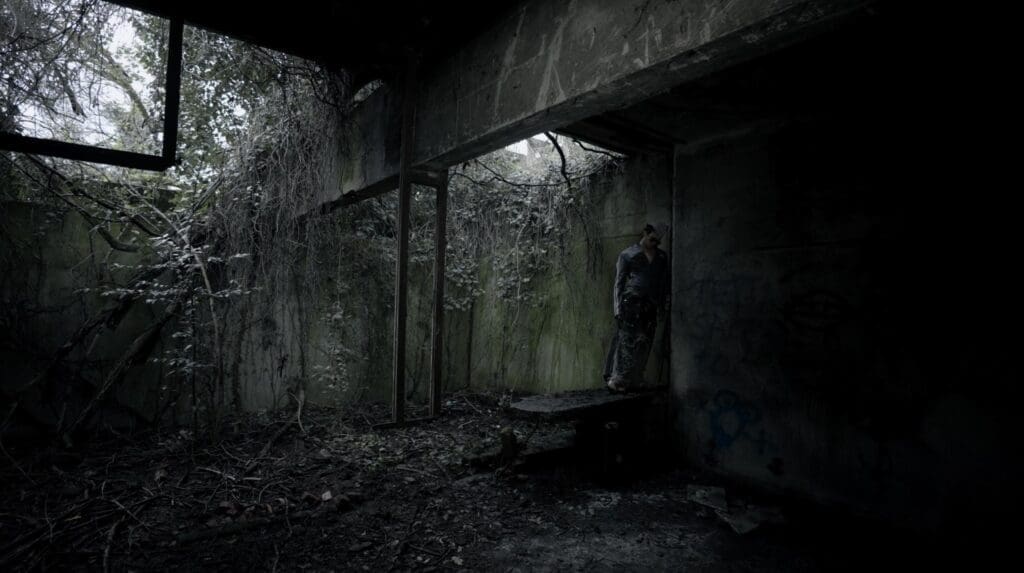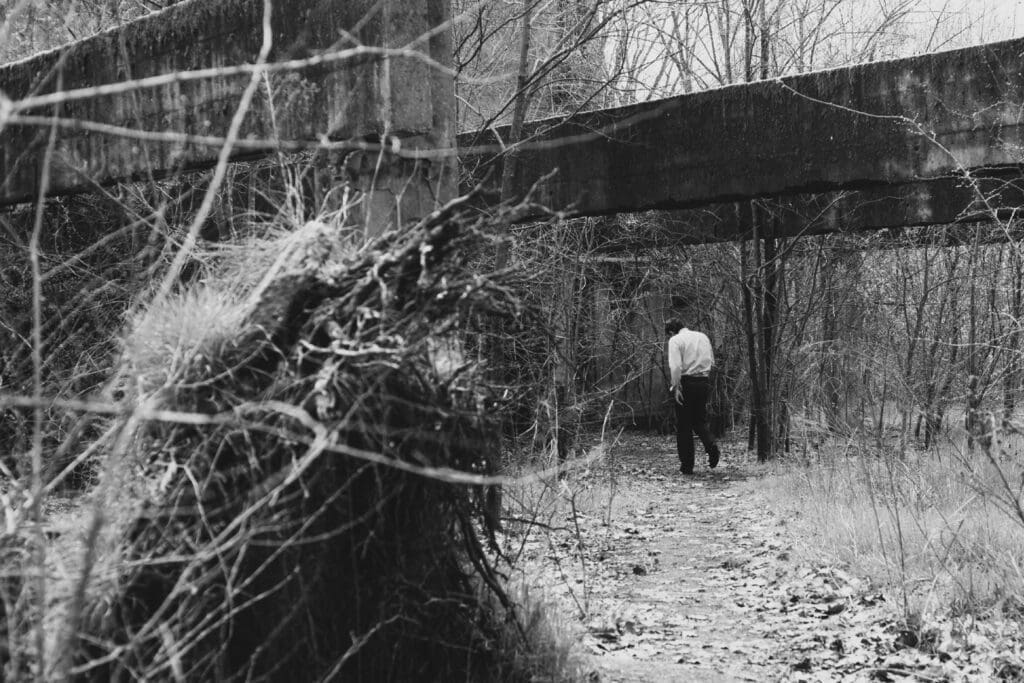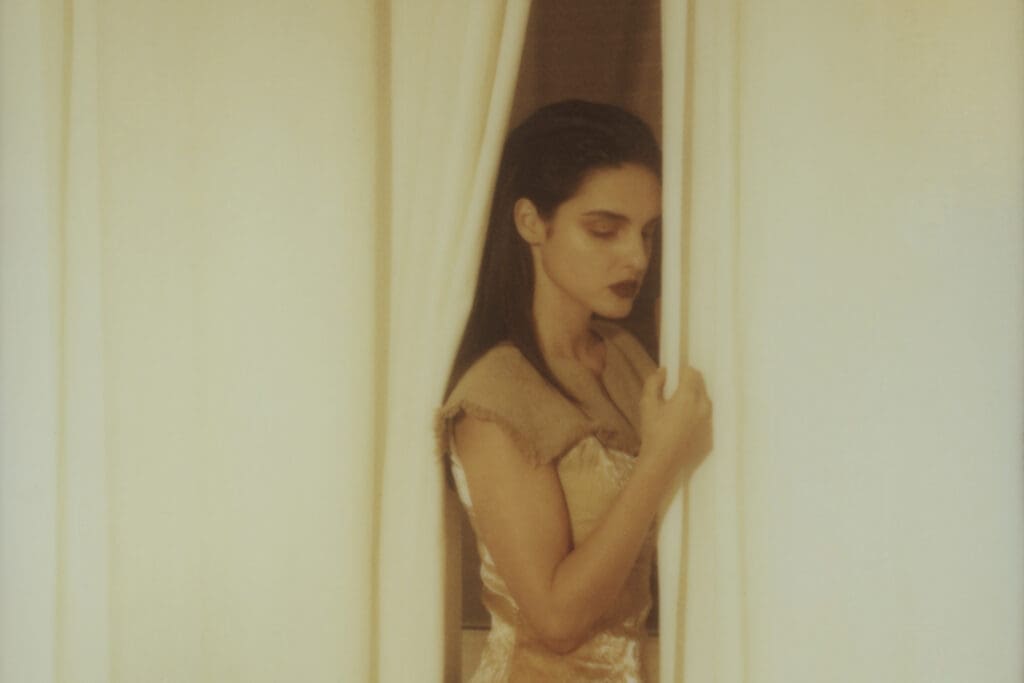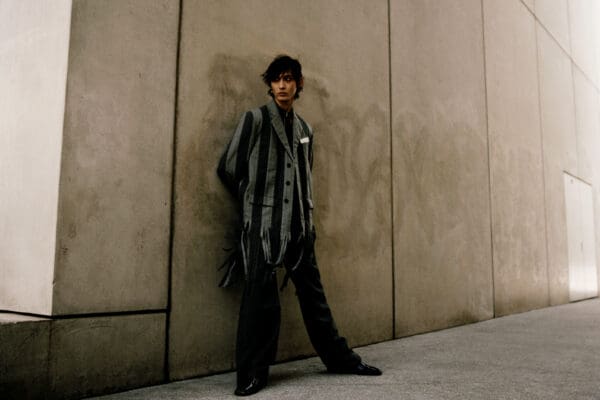by Monika Norwid
photography Alessandro Simonetti
1.4
When I had the chance to interview pro skater Eli Reed, I jumped on it. Am I a fanatic of skateboarding? No. If I were, I’d be giddy knowing that I get to talk to an East Coast boss of the scene. Do I obsessively collect limited edition streetwear? No.
The reason I wanted to interview a pro skater is that I had a dream once . . . where I was perfect. I happened to be riding a skateboard. (The fact that I was riding it on my back like a bobsled down a curvy green island mountain, feeling for the first and only time in my life what danger without fear feels like, is of no importance to this article). Ever since that dream, I have had a weird association with skateboarders as shamans of perfection—not your ordinary gleaming, impenetrable orb of zen, but the kind I believe in—a very specific kind of hardy, scrappy, messy, imperfect perfection. One part instinct, one part talent, three parts chaos, and all sensory engines firing for and in the present moment. A pure improvisational catharsis that, when it happens, proves that beauty has the final word in the universe, no matter how fat, ugly, stupid and republican the world can get.
The kind of perfect that lasts for a moment, feels like forever, can never be proven, can never be truly captured, monetized or explained, and most tragically, can never be replicated in quite the same way. Which doesn’t stop those who know this rule best from trying again and again. New approaches. New mediums. New tools. You can’t blame them. Once you’ve felt it, that rush is a reason for being. Maybe the only one. And some people do in fact find a way to repeat it—with a twist.
*
So my first question to you is just about the acronym, ER [the name of Eli Reed’s brand]. Is there any pun there, maybe referencing some experiences in the hospital? The first thing I thought was, “A skateboarding company with the name ER. Hmm…”
Yeah. Well, no, not at all. I mean, it’s just my initials. I’ve used the abbreviation, but for the full line it’s just my complete name, like any designer brand.
Even if it’s accidental, I like the fact that skateboarding—at least to me, skateboarding represents a kind of willingness to experience life with all its risks, even the biggest risk, which is the physical risk. Have you ever had experiences where you’ve gone through a lot of pain because of skateboarding? And what’s the advantage of that? What’s the positive of having those kinds of experiences?
I definitely have. I mean, I think for any skater to say, “Oh, I want to go pro,” sooner or later you’re going to have to experience some kind of physical pain, and usually through skating it can be pretty crazy. Or maybe it’s mellow. I’ve only broken one elbow skating, but I really messed it up. There’s been so much other stuff—like scraping half my face off once, looking like Two Face [laughs]. I’ve been through some pain, yeah, for sure. But for me—in the question, you worded it as the most excruciating thing is the physical pain—but for me it’s almost the opposite. I’m more scared to get emotionally hurt or heartbroken than to scrape my whole body down the line through skating. I’m just so used to it, or maybe … It’s something I question. Maybe I’m attracted to that kind of [physical] pain? I don’t think I am but maybe there’s something deep down that it is, you know … It’s kind of weird and twisted to get into it but, I mean, sometimes it’s like the physical pain doesn’t outweigh the emotional pain for me.
The physical pain is more literal, it’s more clear, right?
Emotional pain lasts forever. If it’s bad. You know what I mean? It’s harder. If I hurt my foot I’m like, all right, cool, I’m going to do this other thing or I’m going to swim or work on different things and it’s only a little bit of pain. It’s not that bad to me, the physical kind of pain, but …
So it’s almost like physical pain can be an escape from other kinds of pain?
Yeah.
I admire the way that you combine different things and you’re not narrow-minded, in fact you’re very open-minded. I do a lot of things in my life too. I like to joke that I’m a “renaissance man,” and I guess that’s probably true for a lot of people right now. We have to be, in some ways, to survive. The problem with that is—at least for me, it’s hard to prove myself in all these other things when I’m seen from one specific direction. Do you have to deal with people questioning whether you’re a true skateboarder when you do the different things that you do?
Of course. I mean, that just comes hand in hand, I think. I hate to say it but most people’s initial reaction is to pigeonhole every person into one thing. And I talk about it with one of my good friends, Brendan, and it’s like, fuck all this, “Oh, this is a skateboard company and this is that and you’re a skater and you’re an artist.” All that shit is just dying slowly and people are becoming more of a, if you want to call it, a renaissance man or like, you know . . . it’s just life. You’re just into a lot of different things. And if you’re not reading a magazine that has a broad selection of cool people that are doing this, to that, to this, then you’re not reading the right magazine. I’m sick of the people that are pigeonholing. Of course, when I started doing a brand people are just like, “Who does this guy think he is?” People always question, and a lot of people just can’t help but go straight negative on you.
One of the things that people are trying to do when they do that sometimes is they’re trying to protect or control this idea of authenticity.
Yeah.
As if there’s a right way, there’s a proof that something is legit and is real. And if you go out of that formula then it’s wrong. How do you respond to that? What do you think of authenticity?
Yeah, I totally understand what you’re saying. Let’s say some skateboarder’s into my skating and he’s like, “This guy’s the truth on a skateboard.” But then if he sees something that comes out of me that’s some random drawing or art piece that I might’ve done, it’s like, “What? This isn’t like…”
When you see authenticity, how do you recognize it? How do you define it? What’s authentic in something or someone?
To me people are authentic for … I don’t want to say “where they’re from” exactly, but it’s just an attitude in life. There’s a difference between people who are just doing things because that’s who they are and what they want to do, and those people who are gravitating to where they think they should be. It’s like when I go to a restaurant and I see all these people that are just gravitating towards, and talking about not even their own business, just other things and other people’s stuff. It’s like when you go into the Manhattan scene and all that shit, and then you come out to these neighborhoods [in east Brooklyn] and all these people are just living—their authenticity is here, it’s in their everyday life.
It’s something you see and feel, so it’s hard for people to just see an Instagram or something on the internet and get it, you know? For me it’s like when people get to experience me in any way and meet me, they’re usually like, “Oh, shit, this dude’s a pretty real dude.” I’m not trying to be anything that I’m not. Maybe from an outside perspective, people might think “Oh, he thinks he’s this”—or like, “He’s trying to do other things than skateboard when he’s just a skateboarder,” or “He’s just some kid.” I’ve always been myself and so people get to see other sides of me the closer they get, maybe. And then they’re like “Oh…”
For me personally, skating is where I came from, it’s the first thing that I got really, really good at in my life, so I feel like for me to stay authentic is just to never stop skateboarding. As long as I can, physically. And I think I always will. It’s not, “Oh, I did skating, let me just try to do a clothing brand now and just fade off my skating.” I could have. There was a time I was in between some sponsors and people were like “Oh, what are you going to do?” Actually, even in the past year, through a year of figuring out some new sponsorship, I reproved myself in skating again and stayed loyal to that, because I love it and that’s my heart.
It brings you back to the roots.
Yeah.
I think authenticity is also when people just do their fucking thing no matter what other people say. And you seem to be doing a lot of things despite expectations, despite what people expect of you. So that, to me, is always a quality of authenticity, like a kind of freedom from others’ opinions. Whereas people who aren’t authentic, to me, are always conforming to what others think. They want to do what someone will like them to do and will approve them for, you know, it’s just like—
Totally. It’s crazy, too, because the people that you might think are authentic because they stay in one thing or one look their whole life, even with the way they dress, it’s like, you look like an authentic skateboarder but that’s because you’re trying to appease the skateboarding [scene]. Skaters are a crazy crowd, they’re so egotistical and haters. As soon as you start doing something—and fickle, you know what I mean? So one second you’ll be super popular and the next thing is like, “Oh, whatever.” People just talk shit. There’s even dudes on the same team as me that’ll be always giving me shit because I’ll always just wear whatever the fuck I want to wear. Or do something like have a crazy beard hookup one day. I’m always changing, I dress on mood so I might just rock something crazy one day, and that’s never changed since the beginning.
And you always get shit for it [laughs].
Yeah, I’ve always gotten shit from my older friends, too, or whoever, I’ve always gotten shit.
Your grandma [laughs].
So, yeah, yeah, exactly, my mom, maybe [laughs]. No, but I’m just saying that doesn’t change, the same way that this guy might never change his look. But to me it’s just like, you’re just … You’re just scared to pop out the bubble or do anything different. Every day I try to switch it up because that’s who I am, I always have.
It’s not even a question about what’s right or wrong, it’s just everyone has a different perspective on it. There are people that are purists and to them authenticity is a kind of purity or consistency. And for me—and I think you’re doing the same thing—it’s about experimentation. You’re innovating, you’re risking, you’re trying new stuff, and in that you’re constantly coming up with the original thing that is original to you.
Yeah.
It was interesting when you said skateboarding will always bring you back to a kind of original you.
Yeah.
But what I’m getting from your life is that skateboarding itself is a constant … It’s actually like an in-the-moment awareness of your life, right? So it’s almost contradictory or ironic that the thing that brings you back also brings you into the now.
Yeah, that’s a funny concept, I didn’t think of it [like that].
So its not just the past or just your roots, it’s actually being—
Present.
Which is maybe the only thing that’s truly authentic—just being one hundred percent present.
It’s like that for me. To stay authentic, for me, is to skate, which is always to live in the now.
What’s the connection between skateboarding and design? So many skaters become designers. My friend’s husband who was also a pro skater is now an architect. I always think about how skateboarders are physically tracing the outlines of spaces and how that must put an imprint in your head and make you … like somehow want to do that intellectually too?
I think the fact of the matter is that we can understand design and architecture in a totally different way than some people, and we respect it so much more than the common person because we’re looking at buildings, at these spaces, and we’re seeing them in such a different way than the average person. It’s so weird when we go on skate trips and we’re like—like literally everybody’s in a car together—we’re driving through a city and it doesn’t matter where we’re going, maybe we’re not even going skating, we’re just going to eat, and everybody’s just like, “Look at that thing!” “Look at that thing!”—we’re just looking at places in a totally different way. Because we’re trying to see where the spot exists even if there’s no spot, or like there’s a rail here but there’s no landing so there’s grass on the other side but we’re just trying to make it work in our head.
So, yeah, we’re seeing space in a different way, and almost artistically. My mom’s an artist, my brother’s an artist, so I see that connection, like oh, this is like seeing a space in time, as an art thing, and how the skating, it’s like—
It’s a kind of performance art.
Yeah, yeah.
Yeah, or you’re collaborating with your environment.
But the way I see it is the way … I like to think the way I’m looking at a spot or thinking of a skate trip is the way that a jazz musician is trying to hit a note or trying to like—you know what I mean? That’s how I think about it. I don’t know if all skateboarders do that, I don’t think a lot of them do, but that’s how I try to … And every time I’m like … I try to bring it to something like that, the jazz of it. I was in Chicago and I went to the oldest classic jazz bar. And I’m seeing this guy play and I’m just like, that’s how I want to skate. You know what I mean?
We’re trying to see these spots like an artist looking at a blank canvas, like “What am I going to do this time? And how’s it going to be different?” That’s how I want it all to evolve, like music, like everything else. That’s why, even when we talked about being pigeonholed before, to me it’s all bullshit, it’s just life, renaissance, whatever. It’s music, it’s art, design, culture, it’s all—it’s all just life. I can’t skate 24/7, I’m into so much more, it’s just the culture of life, you know. To bring it back to that original kind of moment.
I mean, jazz was an invention, now we think about it as a stand—not a standard but a kind of exemplar.
Yeah.
And it was completely wrong.
Yeah.
I mean, people hated jazz.
That’s why I trip when I think about that too.
Every other musical genre person fucking hated jazz. They were like, “You’re destroying music!”
Yeah, all old jazz musicians were gangsters, they were dope heads and fucking … you know.
Well, you see, what’s funny is—I just thought of this now, but really old jazz musicians, like Cecil Taylor who lives in Fort Greene, I saw him recently, Cecil Taylor is a badass. You can see a badass, you can see how he was at 18 even when he’s 90, you know what I mean? And he was wearing this amazing Missoni sweater and he’s just cool as fuck.
Yeah, and that’s another thing, too, jazz guys always have such great style.
The best style.
Yeah.
But, if you look at young jazz guys today, the guys that come out of the conservatories, or whatever—and they’re amazing, I love young jazz musicians too—but they’re buttoned up, they’re basically way more square, because doing jazz today is sort of a career, it’s like being a doctor or a lawyer. So it’s a totally different type of person that’s going to come out of that environment because they’re not considered freaks.
Yeah.
And they’re not having to tell everybody to go fuck themselves all the time.
Which is almost an insane concept because that’s how I picture skateboarders being in twenty to fifty years, or however long it’s going to be. In the eighties and nineties it was such a rebellious fuck you to the world, and skaters were such badasses. But nobody liked them. Like when I went to school too I got made fun of all the time. Because I switched schools once and it was in East Boston, and one dude was like, “Yo, I saw him skateboarding” and everybody was like [ha-ha-ha] cracking on me skating in downtown Boston.
Like they busted you doing something really wrong?
Yeah, yeah, and even I was like, “Really?” because he was making fun of me and pushing me in front of the whole class. It was a group of people like “Yeah!”—just cracking and laughing. Even I was surprised. I know kids make fun but it was just weird.
And that’s not that long ago. It’s not like you’re fifty, you know what I mean?
No, that was like early 2000s. But it’s funny because it’s changed so much. It’s been huge. I know now in California—I mean, even now around here, it’s like kids that are sponsored in skating have become super popular. Skating is just getting more popular and more popular. I’m surprised it’s not a class—that you can’t take skating lessons in gym class in school.
They’re going to come up with that.
That’s why I’m saying—
Bite your tongue. Equinox is going to have skating workouts.
Yeah, no, I don’t even care, good, I’m just happy for it to grow in any direction. I’m not so connected that way. I think things just kind of evolve on their own. And it’s because new people gravitate towards it and take it for what it is and then it might go in a direction where people are like, “Oh, that’s lame,” about what I was doing, but who cares? That’s how authenticity gets twisted. I’m not so connected—I’m connected to what I get out of it and what I do. I’m not connected to what you’re doing. I mean, yeah, I could crack a joke with my friends, “This is pretty lame,” or “Is this guy crazy trying to skate?” or something like that, but I don’t care. I try to just let go. Unless it’s fucking up my shit. Skateboarding was just a core street thing, like street skateboarding. And now there are skate parks with the biggest websites and followings, and a huge part of skateboarding is magazines, and that’s taking over a huge section of skateboarding.
Do you think that corporate sort of exploitation of a culture, does it inhibit the culture? Do you think it gets in the way of the culture growing?
No, it just makes it bigger.
You don’t have a problem with it.
Yeah, I don’t even—I don’t care. Skateboarding is a huge part of me but it’s just one thing, you know what I mean? I don’t know why I have no problem with it.
Do you even just get annoyed that there’s a McDonald’s skate park or whatever, like a Nike park?
I used to, when I was really young, but I think that’s just a young-minded way to think. I mean, what are you going to do? Hoard your thing away from everybody else in the world? It’s like, “Oh, this is special, you don’t understand why it’s special.” Other people want to celebrate it too, in their way.
I want to talk a little bit about fashion and design. So you’re coming from one totally different field to another—and I know there’s a deep relationship between skateboarding and clothing, but I have a feeling that you weren’t coming at it from the way that most skateboarding companies come at it. What drew you to clothing to begin with?
I guess I’ve always kind of worn whatever I wanted.
Well, you use—let’s look at it this way. Do you use clothing creatively the way you use skateboarding creatively?
Yeah.
How? What does it bring out in you? How do you think it challenges you? What does it do for you?
When I was young … it might even have started just being into Nikes, just getting all sorts of different type of Nikes. I guess I wouldn’t say I collected them like that but I ended up—when I was young I skated for a skate shop that was in the back of this place called The Tannery that was a leather goods store. So it wasn’t even a real skate shop but then they had Nikes and [Wallabies] and I feel like I had access to getting all sorts of random, crazy shit that most skaters didn’t have. And then I got into—when I was young, hip-hop was huge and I was really into crazy t-shirt graphics and different t-shirt designs and just like … just funny shit. I think for me it’s always been kind of like an evolution, so, yeah, maybe I was started with Nikes or whatever but nowadays, it’s like … I’m always trying different stuff and my style is always evolving. And that’s what I was trying to say, with skating. I’m always changing. It’s also the whole style thing with skateboarding. Style is super important so when I put together whatever pieces I want and skate, having that all come together is a whole other thing entirely.
It’s like a performance.
Yeah. It’s like the way things fit. Certain clothes, the way they flow as you skate. About two years ago I got into trench coats a lot and then I was bombing hills with this trench coat. I did this Rag & Bone thing randomly and they had a super long trench coat. I was like, “We should bomb this hill,” and we filmed it, and it was one of those trench coats that was all the way to the bottom and just flowing down the hill. And I just remember, “Holy shit, skating in trench coats is fucking sick,” and then that affected my style—I mean, I was into trench coats but I wasn’t really rocking it at the time and then next thing you know I was doing it more and skating down the street in a trench coat. Sometimes the way things just feel against you or whatever, you know, it’s like … And I guess the thrill is just trying different things. Sometimes for me it’s trying to push different things and skating at the same time, because people are like … I’m not trying to stand out, but I can’t do a uniform.
Well, you’re breaking rules, yeah.
Yeah, exactly, it’s like breaking rules. I like to look at it like that and I can’t stand to see these skaters that just become—the brand gets big and then it becomes a uniform.
It’s conservative, yeah.
They don’t even have their own style, it’s just like you’re wearing this brand and everything that the brand made that season. But, yeah, putting together something crazy and then you pop a flip trick down Broadway and keep pushing and it just looks insane. It’s almost, like you said, performance art in that sense.
Whenever I see people with great style and they’re doing something eccentric or amazing I always want to thank them. I always want to be like, “Thank you. You added something to my day.”
Yeah, that’s what I hope to do, even if it’s just you’re skating down the street and you might’ve sparked someone in some way. That’s just the fun of life, you know.
You travel a lot when you’re touring and stuff, right?
Yeah, yeah.
Do you feel like you freak people out, or do you go to places that have that spark effect on you?
We’ll go to some crazy vintage spot so I’ll just go on my own real quick and that’s where I actually get to find some—like in Atlanta I bought some cool shit. It’s funny because even some of my teammates are the ones that are more like “What the fuck? You just bought that? You just bought this crazy shirt?” I’m like “Don’t hate, man.” [laughs].
You’re like, “You’re going to be wearing it next year, bitch” [laughs]…
Yeah, exactly. Whatever surroundings I’m in, I’ll get inspired. So if I’m in West Virginia, I’m like “Oh, I want to get a Waffle House hat,” like I need that. Every place that I like to eat I try to go to the kitchen. I love getting the little restaurant hats wherever I travel. I feel like a lot of people might rock a Roscoe shirt or whatever but I’ve gone to places where they’d be like “What? You got that from there?” Yeah, just go to the guys in the kitchen and it’ll be like, yeah, twenty bucks for a shirt or a hat.
So now that you literally have a line of clothing of your own, I have to ask—the Western thing is totally radical, I’ve never seen that in a skateboarding context. Was that idea from an environment that you were in, or was that totally just random—where did you get that from?
I kind of pull from a lot of different angles but I love that old Western style—I have a bunch of those vintage Western shirts. So that’s kind of where the basis of . . . at least just the idea for that shirt and then for the photo shoot—I can’t say it came from that shirt but I had this vision. Just classic men’s workwear, the style, the fit of the pants, you know, they’re basically a Dickies fit. And then just putting my twist on things. I love cowboy shit. Also the intertwining of Western and Native American, I think that’s the fucking coolest thing. Their whole style, like the Native American jewelry and their stones and all that stuff, that style is amazing to me. It’s like real, real Americana, you know?
I mean, skateboarding is so American, period. It’s like the most American thing and then you take something else that’s super American, and then you take something that’s pre-American, and it becomes kind of a—I don’t know, it’s a … it’s a really strong but kind of humorous statement. I think it’s more playful than anything else.
And that’s where I want to come from too, because I feel like deep down I’m always like, “Don’t take anything too seriously, have fun,” and that’s why some of the sayings on the shirts are just funny, stupid, whatever. Shirts should be funny and stupid, you know what I mean? I feel like all those seventies shirts that you love and the dumb sayings that you’ll just see at some gas station on a shirt, I like all those things too.
The most subversive thing you can do to skateboarding is point out that it’s just one of many other very American things. It’s not the only one.
It’s funny because my friend did a shirt—he has a skate company—he did a shirt that says, “America, the birthplace of hip-hop and skateboarding.” What’s funny is that people don’t get these relationships, to them it’s just, “Oh that’s that,” or “I’m like this,” but it’s all right next to each other and plays hand in hand and it’s all really American.
So the business side of your life—from what I hear, going into any production in fashion is super risky and really stressful. How did you learn? Did you pick up some books on Amazon? Did you self-educate? Did you have friends who helped you?
I pretty much fucking did shit on my own. You know, with help from other friends that have brands, who can kind of feel me around to different places. And I spend a lot of time in LA in the winter, just to make sure everything falls right, that it went right, was put together right. And definitely minimums are tough when you’re just exploring things in fashion, or just trying different things. I only sell to a few different stores, Opening Ceremony mainly. If people gravitate towards it, awesome, if not then that’s cool too.
Do you have a dream scenario for your clothing line or for being a clothing designer in general or are you literally just taking it like, “All right, I’m going to just do this now and see what happens”?
I definitely have a stronger, wider, bigger vision of taking it to a serious level. I kind of always believed in myself. I’d like to have as much success as anybody for sure. I’m not going to say, “Oh, I’m just doing some cool shit.” Obviously I’m driven and I’d like to be successful and create a strong business behind a brand. But right now I’m just really happy where I’m at and trying to enjoy the process of things and not be so worried about the end result. I’m just living in the now, I try to bring it back to that again.
You will inevitably, because of the way that you approach everything, right?
Yeah, I hope so. I have a lot of new ideas that are already swimming in my head to infuse it all with everything that I’m really into, kind of how we’ve been talking, the concept of “This is just life,” and fusing skating, art and music and just everything all at once, and a way to put things out.
You began, or we began the conversation with the idea of pain and physical pain, and you said something really pretty deep, which a lot of people don’t want to talk about, which is that there’s this other pain that’s much more difficult, which is emotional. And there is a whole element to clothing that is emotional, and it’s related to where it comes from, how it’s made. Our country is right now in this weird place with clothing production. I don’t know if you heard about this TPP [Trans Pacific Partnership] where the US government has basically created a trade agreement with a bunch of other countries, which just passed Congress recently, the other day, where only corporations can sue the American government. So if we outsource our work, which we do all the time, and someone gets sick or hurt because of their job but they’re working in that foreign country, they can’t sue our government. So there’s no accountability if anything goes wrong. That goes for environmental issues, that goes for any problems that our companies cause to foreign workers. So let’s say you become a huge brand and it’s way cheaper for you to make stuff in Mexico, whatever, your …
A mom and pop place that like can break their ass with little kids making shit, they can’t really do shit …
Totally. Yeah, and you are totally protected by this agreement so your company will never have to deal with anyone suing you.
That’s going to make you, that can …
You can do whatever the fuck you want.
That’s crazy.
And this agreement basically exists so that American corporations are protected. It makes our corporations really happy. It makes the governments of those countries happy to sign it because they’re basically getting those companies to work there, so they like that for business. But it’s the worst thing that can happen both to the people over there but also to the people here, because now those companies are definitely sending all their jobs outside of the US.
So one thing that’s always sort of been on my mind, I love vintage, I love menswear. A lot of things that we love about vintage clothing is that it was made in a different era and it was made in a different way, and people cared. So we’re talking here about being in the moment, and there’s a thing that happens in the moment, whether it’s physical pain or emotional experiences that we pretend aren’t there, like when we wear clothes that are made by shitty companies or by people under really horrible conditions.
And I wonder to what extent the process of making stuff and how things are made, whether you think about that in terms of your own game. That was a really long question. It wasn’t a question, it was a speech. I just gave you a speech.
I know what you’re saying. Yeah, I think that it is important to me and everything I make is made in America, downtown LA, the shirts are in Orange County, t-shirt press guy, and they’re all fucking, you know, people on their own, with their own businesses too, which is pretty rad, you know? So that’s awesome.
And who knows where it ends up too, it’s just the disposable clothing stuff where we’re literally just, like we just keep cranking shit out and people are like “I don’t know where it comes from, I just press a button and it shows up, and then I’m going to throw it out two months later because there’s a new thing.”
Clothes can have that baraka. You go to Tompkins and you see like those punk rock dudes that have been living on the street for years but they have that jacket that’s traveled with them on some trains or all over, wherever they’ve been, which could be the dirtiest, craziest places, and they have all these patches and gnarly shit, it’s like the jacket is sick, you know what I mean? It’s amazing and it carries that baraka or whatever they call it. I’m making a brandI mean, not that it’s like any brand, but I’m just making clothes. But in a sense they’re so close to me because they’re so personal that I hope people can feel that—it’s basically just me putting what I say on a shirt or what I see on a shirt and pulling vintage styles and giving them my twist.
So I wanted to just ask you, I guess because you’ve mentioned your mom before. Was she around when you were really young, or was she a working mom?
Yeah, I was, my parents were divorced and I was with my mom most of the time and she was working at the AIB, Art Institute of Boston, teaching. And I saw my dad on visitations but more raised by my mom and [she was] just always definitely a real powerful influence . She was really a free person and was always the weird one in her family of eight brothers and sisters, you know, she was the artist. Yeah, it was a really, really good positive mom, but she went through a lot with marriages and boyfriends and stuff, and raising us, so I think her work, I don’t want to say suffered, but she didn’t get to focus and go so far with her artwork herself where she wanted to. But she’s still having shows and doing her thing and has a studio in New York too which is awesome.
But did she want that for you?
I did whatever the fuck I wanted. My parents always supported me, they drove me to skate parks when I was a kid. My dad is awesome too in that sense. He’d drive an hour and a half to go to a skate park, and I had other friends where their parents were like, “What the fuck?” and wouldn’t be down with the skateboard thing, and my parents always supported it. When I was twelve I won this contest and I was underage so the next round was in LA and my mom and my brother flew, they flew them to LA as well so I got to take my mom the first time to California and things like that.
That’s awesome.
Yeah, she always supported skating, I was real lucky in that sense. And she loved it…
They didn’t judge you for …
No, I think she understood it and the only person that didn’t support it was my doctor, when I broke a wrist and then I broke my elbow and I broke my wrist snowboarding. Just at that time I was getting kind of hurt a lot. I think, at least for pain in skating, you go through your worst things I think when you’re just figuring out how to get around, you know, maneuvering at the beginning and then after that it’s a different . . .
Okay, one more question. When you see somebody on the street or in a room or whatever and they have like great style, what does that tell you about the person before you even talk to them? Like instinctively, what knowledge are you getting from them?
That’s something I never really thought of. I guess it’s more like I’m not really getting so much because I never really judged that book by its cover, but it’s more like an intrigue, so I want to start the conversation, I want to know more. Or even if it’s a girl, I mean to me if a girl has style, it’s attractive for sure. You know right away even if the physical isn’t as attractive as just what they’re wearing. So it’s just more of a spark of intrigue I think, you want to know more. It’s just interest right there. And if they open up their mouth and you like what they’re saying as well, even their choice of words or how they sound, you’re like “Oh shit,” you know what I mean?
So style is kind of an invitation for people to engage with each other.
Yeah, it’s an exterior spark of things, you know?


